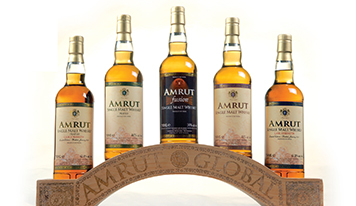Climate change mitigation is introducing innovation in brewing materials, technology and transportation
After hiking in Utah’s Canyons National Park (US) more than a decade ago, Patrick Tatera was desperate for a beer. Knowing that it’s about 95% water Patrick, a chemical engineer, began pondering how he could dehydrate beer for easier transport; then rehydrate it when he was ready to drink it.
Patrick began experimenting and realised that a technology that could do this on a large scale could impact the entire beer industry, which is plagued by a distribution chain that is not eco-friendly.
Global transportation accounts for an estimated 20% of beer’s carbon footprint. Beer, wine and other alcoholic beverages are generally shipped over long distances in climate-controlled containers and vehicles to prevent spoiling.
In addition to farming and refrigeration, a lot of beer-related emissions result from traditional farming practices, uncontrolled emissions, and hauling kegs and other bulky containers to market through the existing, not-so-green infrastructure.
Patrick finally hit upon a solution, called BrewVo, and went on to establish Sustainable Beverage Technologies (SBT) in Colorado (US). BrewVo is a process that creates highly concentrated beer that can be transported at one-sixth the weight and volume of traditional beer.
‘Nested fermentation’
The BrewVo solution is similar to traditional brewing, except that the beer goes through multiple rounds of it, according to Scientific American Journal. In what SBT calls the “nested fermentation” process, a standard beer is brewed.
The machine then removes the alcohol and finally adds a new batch of wort so that additional fermentation can take place. This process is repeated several times, yielding a viscous concentrate that the company says is much more aromatic than a fully hydrated beverage.
SBT claims its beer concentrates can be frozen to extend their shelf life.
All the good stuff – the flavour from the hops and grain – is shipped in plastic bags. At its final destination (a bar or brewery) the contents of the bags are mixed at a ratio of one part bulk beer, six parts water – and alcohol if desired – and then carbonated before being bottled, canned or kegged. It can then be sold as standard beer, or as low- or non-alcoholic brews.
Many brewers in Colorado are already using BrewVo to craft both full-strength and non-alcoholic versions beer under their own labels. Some others worry that that adding different quantities of alcohol will change a beer’s taste in unexpected ways.
However, a non-alcoholic beer brewed with BrewVo technology won gold at the 2019 Best of Craft Beer Awards competition in the US. Another non-alcoholic Irish Style Dark, also produced using a BrewVo machine, recently won bronze at the Australian International Beer Competition.
Hops or yeast?
Hops, which give beers their distinctive aromas and flavours, are among the most expensive inputs in the brewing process. Each kg of hops, which can make up to 90 litres of beer (depending on the recipe) can cost upwards of UD$ 15 – their landed cost on Indian shores is considerably higher.
Moreover, growing 1 kg hops can take up to 2,000 litres of water (depending on local weather and soil conditions). These figures are borne out by studies in Washington and Oregon, two of the biggest hop-producing states in the US, according to National Geographic magazine.
Charles Denby, a post-doctoral researcher at the University of California in Berkeley, was studying genetically engineers yeast and brewing beer in his spare time when he hit upon an idea in 2013.
Applying his expertise in yeast genetics and synthetic biology to making beer, Charles and his colleague, Rachel Li, set to work engineering a strain of yeast that would produce terpenes, the chemical compounds in hops responsible for the “hoppy” flavour.
In 2018, Charles and Rachel reported in the journal Nature that beers brewed with the strains of yeast they had developed tasted even hoppier than traditional beers. This was borne out by results of a double-blind taste test reported in the study.
The duo established their company, Berkely Yeast, in a bid to replace and reduce the reliance on non-eco-friendly farming of hops. However, most breweries sign multi-year buying contracts with hops farmers in advance, to ensure regular supplies.
To overcome that stumbling block, the company is promoting its yeast-derived flavours as a low-cost, dependable alternative to hops.
Other efforts
Swedish company Alfa Laval has also made progress in the direction of dehydrating beer. Its Revos beer-concentration machine (designed at the Massachusetts Institute of Technology) uses reverse osmosis to concentrate already brewed beer, as well as wine or cider.
This technique has long been used to filter out contaminants by forcing liquid through a membrane with extremely tiny pores. But in the Revos machine, the high-pressure, low-temperature process removes water from beer while leaving alcohol, flavours and aromas in the remaining concentrate.
Once a beer concentrate reaches its destination, it requires another specially designed machine to prepare it for consumption. Alfa Laval sells its own proprietary tap systems that adds filtered water and re-carbonates the beverage.
Packaging, which contributes to more than a third of beer’s emissions, is the last mile when it comes to sustainability. There are other ways to make it more sustainable with some companies aiming to establish systems that ensure glass bottles will get reused – instead of ending up in landfills, as nearly two-thirds of glass products in the world currently do.
Hybrid yeasts
Additionally, scientists at Manchester and Leicester universities (UK) have finally developed yeasts that will give new flavours to beer, a solution that has baffled brewers since the 1800s, Xinhua news agency has reported.
The scientists revealed in a study published recently that they have developed unique fertile hybrid yeast strains that offer novel and exciting options for flavours, aromas and brewing processes for the drinks industry.
The type of yeast used in the fermentation process influences how a beer tastes once it has been brewed. There are currently two main categories of yeasts – ale and lager – plus hundreds of variations used by modern day brewers in a booming global industry.
The newly created hybrid yeast strains have been shown to successfully breed and produce offspring with specific desirable characteristics required for the beverage manufacturing process.
Dr Daniela Delneri, professor of evolutionary genomics at the Manchester Institute of Biotechnology, says: “This research tackles the fundamental issue of hybrid sterility and multi-generational breeding. With my colleagues we were able to overcome species barriers and pinpoint the genetic traits unique to the hybrids.”
This technology has the ability to revolutionise the current practices by allowing the rapid creation of efficient tailored yeasts carrying specific, novel, and important traits. For example, yeast hybrids including traits from the newly discovered species can add a spicy clove note to the final aroma of the fermented product.
Climate concerns
While SBT, Berkeley Yeast and Alfa Laval are creating innovative solutions, beverage companies are shifting their entire production processes to be more environment-friendly.
International beer manufacturer, SAB Miller, has announced that it was changing how its brewing ingredients are prepared in a move that will help to reduce the company’s carbon footprint.
Diageo, one of the largest multinational beer and spirits producers in the world, owns over 200 well-known alcoholic beverage brands, including Guinness, Don Julio, Johnnie Walker, Smirnoff and Crown Royal.
Diageo has pledged to eliminate its green-house gas emissions by the year 2030. It is increasing efficiency by way of upgrading equipment, improving building insulation, and speeding up the production process.
The company captures and reuses heat energy, which is required in several stages of production. Diageo also uses renewable energy sources such as biomass generators fuelled by by-products from the brewing and distilling processes. Waste from farming hops, barley and other ingredients are used to generate energy and electricity on site.
So far, Diageo has three carbon-neutral distilleries and is working to make their other 150 production sites worldwide carbon-neutral in the coming years. Its strategy to reach net zero emissions was recently certified by the Science Based Targets initiative. It is a joint effort by CDP Worldwide, the United Nations Global Compact, World Resources Institute, and the World Wide Fund for Nature.
What could be encouraging for brewers in their quest towards sustainability is that a 2018 study in the US found a majority of beer drinkers would pay more for sustainably produced beer!













